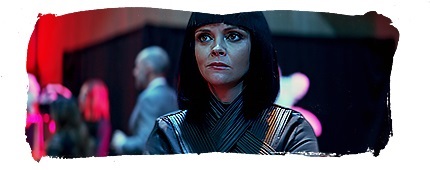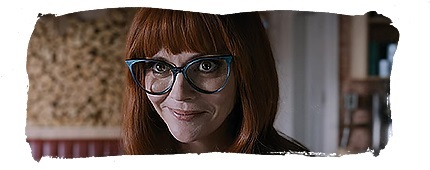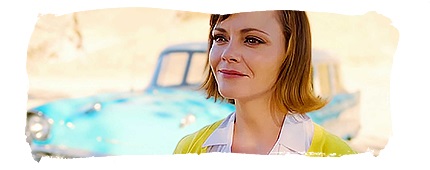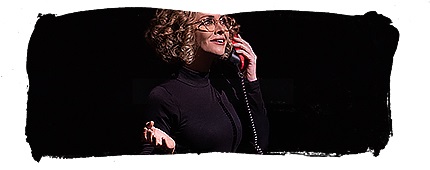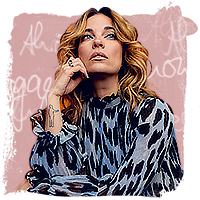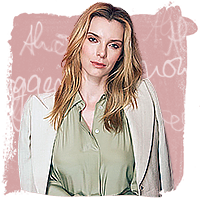
The Minx Effect
The Face, October 1998
Hollwood has never been so full of clean-cut starlets. Pretty. Sweet. Wholesome. But who wants them? Here’s Christina Ricci.
Christina Ricci picks me up from my hotel in her black Audi. Despite an assurance that she’s ‘a pretty safe driver, every couple of minutes, in between smoking chewing mints and singing quietly along to The Cure or Depeche Mode or Jane’s Addiction or whatever happens to be on the radio, she will vehemently dismiss her fellow drivers as bastards, assholes or, even, jerks.
“I get angry a lot,’ she says. “Especially when I’m driving. I was mad on the way here, because some asshole cut me off.”
For those already familiar with Christina Ricci, these little outbursts will seem inconsequential. over the past few years she has been portrayed as kooky, freaky and border line psychotic, largely because of a series of more or less ironic statements concerning guns (she wants one, badly), incest (she’s obsessed with it) and possible self-mutilation (she burned herself with cigarettes to get attention). Now, it seems, she has had enough. She is, as she puts it, tired of always sounding “like this crazy Gothic witch”.
“It’s really far from the truth,” she sighs, with an air of exasperation. “I’m not like this disgusting, off-putting, obnoxious, dark girl. Do I seem like a weird person?”
We are driving down to Montana Avenue in Santa Monica to buy some candles. Christina has just rented a small house in West Hollwood, which she shares with her boyfriend, Matthew Frauman – a 25-year-old aspiring actor. At the weekend they plan to hold a party for a friend visiting from New York and Christina wants the house to look a little more lived-in.
She pulls up outside a small shop called Cinzia, an arts-and-crafts grotto of china figurines, over-decorated mirrors and homemade mobiles. After briefly considering a pair of embroidered, paisley-pattern cushions, Christina settles on a pair of peach-scented candles, It’s the last place one would expect her to do her shopping.
“Yeah, well,” she says, stepping into the sunshine and lighting a cigarette. “There’s a lot of things people don’t’ know about me.”
T hat Christina Ricci would cause trouble for Hollywood was obvious from her screen debut when, as a smart-mouthed nine-year-old in Mermaids, she upstaged both Cher and Winona Ryder. She then repeated the feat as the mordant and hilarious Wednesday Addams in the two Addams Family films. She even – with her natural charm and ability to scream at a pitch almost beyond human hearing – transformed Casper, an otherwise anodyne ghost story for small children. And, along the way, she became a star.
Then things didn’t go to well. There was Now and Then, a flimsy, Demi Moore – produced coming-of-age movie. The Last Of The High Kings, Gabriel Bryne’s ill-conceived meditation on Irish republicanism . And last year’s That Darn Cat, in which she an Morgan Freeman went in search of the lost feline. Then came The Ice Storm. In Ang Lee’s Seventies psychodrama, she turned in one of the most affecting portrayals of teenage uncertainty in recent memory. Her performance was controlled and intelligent. Serious, even, and not at all childlike. Better still, the film was a huge international success.
It also confirmed what many had previously suspected. Namely, that Hollywood needs Christina Ricci. There is no one like her, especially not amongst the current crop of neo-adolescent girls-next-door – Neve Campbell, Sarah Michelle Gellar, Jennifer Love Hewitt. She shows no interest in apeing their one-dimensional scream-queen routines (“I think people have got it now, that I’m not doing those kind of movies”) or enhancing her profile via anodyne TV serials (“I never want to do TV”)
Instead, she has chosen a series of left-field, mostly independent, movies. She’s the “Laundromat Nazi” in Pecker;- a wan, small-town dancer in Vincent Gallo’s semi-autobiographical Buffalo 66; an acid-crazed 14-year-old in Fear And Loathing In Las Vegas; and a teenager who steals her gay brother’s lover in The Opposite Of Sex.
Towards the end of September she will take a carefully measured step back towards the mainstream, joining Tim Burton and Johnny Depp for Sleepy Hollow, Burton’s take on a curious piece of World War II folklore about a vicious German mercenary who stalks small town America and can only be killed by having his head cut off. Typically, it was not a premeditated move.
“I don’t have a dream of being in any certain kind of movie,” she says. “Acting is just something I do. It’s the same as when I was a kid. I thought it was kind of ridiculous people actually made a living doing it. Of course, now I don’t think it’s ridiculous, because it’s how I make my living.”
T his is what an actress wears on her day off: jeans, black platform heels and a yellow T-shirt with “If you love me, read me a story” printed on the front in child-like writing. Christina can’t remember where she got it – “probably some second-hand store” – since she tends to buy her clothes impulsively. Only when she has to attend a premiere does she drive to the designer shops on Rodeo Drive to pick out a special outfit. “But then I can only wear it once, because it’s been photographed.”
Do you ever check in the tabloids to see how you looked?
“Sometimes. When I’m in the supermarket or something. I usually end up on the ‘Worst Dressed’ list.”
Earlier this year, Christina made a more subtle alteration to her appearance. She called a tattoo parlour on New York’s Lower East Side and had a lion tattooed on her right shoulder. She had been meaning to get it done for over two years, ever since she found a piece of cardboard at a cash machine with a doodle of a lion on it. The drawing appealed to her. It reminded her on Aslan, form The Lion, The Witch And The Wardrobe.
Ever since I was little I’ve always loved the Narnia Chronicles, ” she says. “I give it out to people who haven’t read them. I used to carry it around in my bag. I’d be like ‘Here have this copy.'”
She hasn’t had much time for reading lately. She tackled Fear And Loathing In Las Vegas before shooting started on the film, but never finished it. “I didn’t like it. I didn’t relate to that idea of romanticizing drug use. If I read a book and I don’t like it within the first 30 pages, I put it down. Because I figure it’s a waste of time.”
One of her favorite authors is Ayn Rand who, back in the Fifties, founded a cod-Nietzschean school of philosophy known as Objectivism. The idea is that only those who look after themselves first, and others second or not at all, will succeed in life.
“I’m not into the philosophy. It’s not practical because we all have emotions. I’d love to be the kind of person that’s out for myself. It makes you powerful, not being susceptible to other people. But even though I have problems doing that, I’m very individual. I only have three really good friends. I can count on my hands the people I like to be around.”
R icci, as you might expect, is an Italian name. “But the Italian blood has been bred out of me. There’s an Italian four or five generations back who married an Irish woman and they all had sons. So they married more Irish women, there were more sons, and more Irish women. Now I’m basically Scots-Irish.”
Her father, though, was intent on living like an Italian. Ralph would cook pasta, chicken marsala and spinach coup for his family, and named his children Raphael, Dante, Pia, and Christina. “He thought he was s Mafioso, so he gave us all Italian names,” she says. All her siblings now live in New York. The eldest, Raphael, is a concert promoter, and recently arranged a show for Radiohead. Dante is a writer, who supports himself working at a restaurant. Pia is on the staff at an international travel magazine.
On our way out of Santa Monica, we pass row after row of neat houses set amongst tall palms and lush greenery. Christina grew up here for the first three years of her life. She doesn’t remember much about the place, except Pia went to elementary school nearby and would grab Christina each day after classes and lead her down into the basement of their house to play school. Pia would play teacher and Christina her sometimes reluctant, but more often willing, student. It was partly as a result of these impromptu lessons that Christina could already read by the time she was three.
It was Christina’s brothers, on the other hand, who introduced her to smoking. She was 11, and they took her out into the back garden and gave her a cigarette. Of course, she nearly passed out coughing. “They thought it was funny,” she says. A full-blown habit uneasily tolerated by her mother, didn’t develop until she was 15. Three years on she lights up at roughly half-hour intervals. Her preferred brand is Parliament Lights, mostly because of their curious recessed filter. “That way you know not to put the wrong end in your mouth,” she says.
W hen writer-director Vincent Gallo offered Christina Ricci a starring role in Buffalo 66, he joked that it was to be “a film about racy Italians”. As it turned out, the film is a sometimes sad and wholly uncompromising view of life in upstate New York in the dead of winter. It also centers largely on the tortured persona of Vincent Gallo himself. Ricci’s character, a forlorn-looking dancer kidnapped and forced to act as Gallo’s wife in front of his estranged parents, is for the most part presented as his negative: quiet, undemonstrative, needy.
Throughout the film, Ricci adopts an oddly disturbing and submissive manner. She also has bleached hair and wears a strikingly short satin-look dress, apparently purchased from a local charity shop in Buffalo.
“I made him make it longer, ” she says. “When we bought the skirt it was a certain length. He wanted to keep it that length and I wnated to add two inches. We settled on an extra inch.”
It’s quit revealing.
“He wanted it to be ethereal. She’s supposed to be an imaginary person.”
For those who still view her as some kind of child-who-never-grew-up, The Opposite Of Sex will provide a further set of surprises. Although Christina describes it as “a riot” and “all about my cleavage, basically”, it was the sharp, sardonic quality of the script which attracted her most.
“It’s stuff you don’t get to say in real life. Things you’d like to say, but can’t.”
Surely you speak your mind anyway?
“Not as often as I’d like to. You’re just considered rude or out of line. I’m fairly outspoken, but I was more outspoken as a kid. Kids can get away with it. You can’t get away with it once you reach a certain age.
The film has also won her a sizeable gay following , thanks to the film’s irreverent view of gay relationships and Ricci’s sarcastic voice-over narration – “Gross,” she says after picking up a gold urn containing the ashes of her brother’s dead lover.”But notcie how pretty the jar is. That’s typical gay.”
Later in the day we drive over to the Beverly center, a monolithic concrete shopping mall in central LA, to buy a present for her friends birthday. After a brief and unsuccessful look at some Diesel sports bags, we head for Bebe, the US answer to the French Connection, where she picks out a pair of tastefully decorated diamante hair slides.
“You’re my third favorite person in the world,” says the cashier, a muscular black man sporting a large buckled D&G belt.
“Really?,” she says, looking a little embarrassed. “The third?”
“Yeah after my mother and my boyfriend.”
C hristina Ricci was born in Los Angeles in 1980. Her birthday is February 12th. “The same as Abraham Lincoln,” she says. When she was three years old, her father moved the family to the East Coast, and set up a psychiatric practice in New York. Their first house was on Long Island and looked out over a beach. “It was really beautiful,” she says. “There was a nature reserve right across the street. We used to run around in the woods getting lost. We had three dogs and two cats. They’re all dead now.”>
From Long Island they moved to New Jersey and “a normal, two-storey house”. It was here that her father began holding primal scream therapy sessions in the basement, and she could often hear his patients screaming late into the night. At other times, strange people would stop by at the house and ask to see her father.
“My dad had some weird friends. Well, they were only weird because they were his patients. They’d come by for social visits sometimes. There used to be this one woman who called at the house when I was eight. Once she asked me, ‘Will you tell your dad that my mother’s not talking to me, I’ve started drinking again and I’m having all these nightmares about sexual encounters.’ And I’m writing all this down, spelling it out, ‘S-E-X-U-A-L E-N-C-O-U-N-T-E-R-S’. My dad was furious that she actually left this message with his eight-year-old daughter. I always thought it was kind of entertaining.”
By that time she was already a working actress, having been discovered the previous year in a Christmas pageant written by one of her teachers. Christina was in a section which dramatised the carol “The Twelve Days of Christmas”, acting as a kind of chorus to the unfolding drama. “I was the one telling the story,” she says. “Like, all I wanted was a basketball and everyone kept getting me this ridiculous shit – turtle doves, a partridge in a pear tree.”
In the audience was a critic whose son had showed similar promise at the same age and was already working in TV commercials. She put Christina’s mother in touch with an agent in New York. And, as was to be the case throughout Christina’s career, the agent was duly impresses.
“I was an impressive kid. I was really smart when I was little. I always seemed older, because I read a lot. I had a really good vocabulary and I asked a lot of questions. I was much more impressive as a child than I am now. When you’re a kid people don’t expect s lot form you, so if you actually come through with anything, they’re impressed. But now they expect a lot more.”
Christina hasn’t spoken to her father in over two years. He now works as a drug counselor in San Luis Obispo in northern California. “I was always moving around,” she says, “and he lived so far away. So you know…” Her mother, Sarah, who worked as a fashion model in the late Sixties and early Seventies – “She was really, really skinny. She used to do wardrobe fittings for Twiggy” – she still lives in Chelsea in New York. She also takes care of all Christina’s fan mail. Christina herself never reads it.
“She has a file. In case anything bad happens. She has evidence. I’ve never been aware of anyone getting obsessive about me. But it’s scary. And there’s so many ways for people to find out where you live.”
Have you ever had any bad experiences?
“No. I’ve heard stories from other people.”
On the internet discussion groups devoted to her, the most hotly debated topic is the size of her breasts. Occasionally, one of her more loyal followers will contribute something a little more sensitive, such as this touching poem: “Ricci/Is just/Peachy.”












